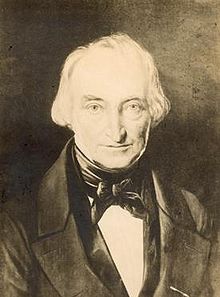William Christopher Zeise
| William Christopher Zeise | |
|---|---|

|
|
| Born |
October 15, 1789 Slagelse Denmark |
| Died | November 12, 1847 (aged 58) Copenhagen Denmark |
William Christopher Zeise (October 15, 1789 – November 12, 1847) was a prominent early Danish organic chemist. He is best known for synthesising one of the first organometallic compounds, named Zeise's salt in his honour. He also performed pioneering studies in organosulfur chemistry, discovering the xanthates in 1823.
William Christopher Zeise was born 15 October 1789 in Slagelse, the son of an apothecary, Frederick Zeise (b. 1754, d. 1836), who was an old friend of physicist Hans Christian Ørsted's father. Zeise attended Slagelse Latin school until he went to Copenhagen in 1805 to take up an apprenticeship under Gottfried Becker as a pharmacy assistant (Apoteksmedhjælper) at the Royal Court Pharmacy. Gottfried Becker, was an accomplished chemist who was employed as extraordinary Professor of Chemistry at the University. However Zeise felt dissatisfied there and returned home complaining of his health after having been there only a few months.
Around this time his interest in science (Natural Philosophy) began to develop. He familiarised himself with the new quantitative chemical theory of Antoine Lavosier; and read widely, including - Nicolai Tychsen's "Apothekerkunst" (Theoretical and practical instructions for Pharmacists, 1804), Gren's Chemistry, Adam Hauch's Priniciples of Natural Philosophy and Ørsted's papers in Scandinavian Literature and Letters (whose treatise on spontaneous combustion made an especially strong impression on him). At the same time he experimented with a home-made voltaic pile. At 17 years old, he rearranged his father's pharmacy in accordance with the new pharmacopoeia of 1805, which had imposed the antiphlogistic nomenclature. About the same time (summer of 1806) he mentioned in his diary "a most remarkable awakening within me for something higher, for scientific creative work in general, but for Science, chiefly Chemistry, deeply and in particular". How strong an impression this inner experience had made on him, can be established by the fact that he now wanted to return to Copenhagen, not to return to the Court apothecary, but to pursue a path studying chemistry.
...
Wikipedia
